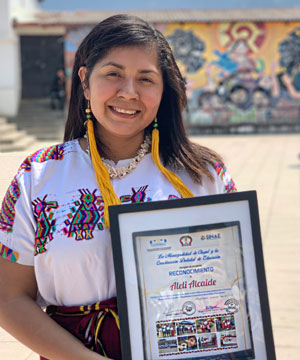Aleli Alcaide
Returned Peace Corps Volunteer and New Leaders Council Alumni

What do you enjoy most about your job?
I have enjoyed seeing how organizations are becoming more progressive towards public health policies and interventions, especially in regards to women. Historically, public health has proven to be quite effective, but only in specific populations. BIWOC (Black, Indigenous, Women of Color) has been unable to reap the benefits that come due to systemic injustices. There is still a lot of work to create an equitable public health system that benefits everyone. It is phenomenal to see how we, as public health professionals, are learning from past mistakes to develop policies, health education, and interventions that are more progressive, culturally competent, and effective.
What inspired you to pursue an MPH degree?
Throughout my undergraduate degree, it took me awhile to settle on a career path. As someone that is first generation, we are often led to believe that there are only three career paths out there for us: doctor, teacher, and engineer. Once I discovered public health, I fell completely in love with it and realized that this was the path for me. Public health is everywhere around us. It is behind policies, such as the ban of smoking indoors in public spaces. It is in medicine such as the push of vaccinations. It is even in infrastructure as we are starting to see the push of building designs that encourage physical activity. I love public health due to the many and diverse opportunities that come with being a degree holder.
Why did you choose Illinois for your MPH?
I chose Illinois due to the many opportunities that the institution holds for its students. I went to Illinois as an undergraduate and majored in Global Studies. As someone that has always been passionate about global health and international development, I was grateful that the program allows the flexibility to connect with the many different departments that are across the campus.
How did your Illinois MPH degree help prepare you to work in the field OR what were the highlights of your time in the MPH program?
After completing my MPH, I embarked on my Peace Corps journey in Guatemala. I was a Healthy Schools Coordinator in which I worked to implement a Guatemalan government initiative that promotes health and hygienic practices in schools. I collaborated with the Ministry of Education, Ministry of Health, and inter and non-governmental organizations to organize events and implement different trainings. One of the projects that I was able to worked on was collecting data on junk food and plastic consumption in elementary school children. The data led to me drafting a policy that banned junk food and plastic consumption in schools across the municipality. Another project was creating and facilitating a university course to aspiring teachers on healthy practices in the classroom with the University of San Carlos of Guatemala. I’m currently acting a consultant for an up and coming non-government organization as well as working with the Pan-American Health Organization in designing a three-year strategic plan for the Healthy Schools initiative in the Ixil region.
What advice do you have for current students or prospective students?
It’s how you use your MPH degree that matters. Everything that I learned in the MPH program at Illinois, I have put into use. From the health behavior theories to project evaluation to policy, I am forever grateful that Illinois has prepared me. Although the MPH program is fairly new, it has the potential to open up many doors for you as long as you’re willing to take the opportunity.
